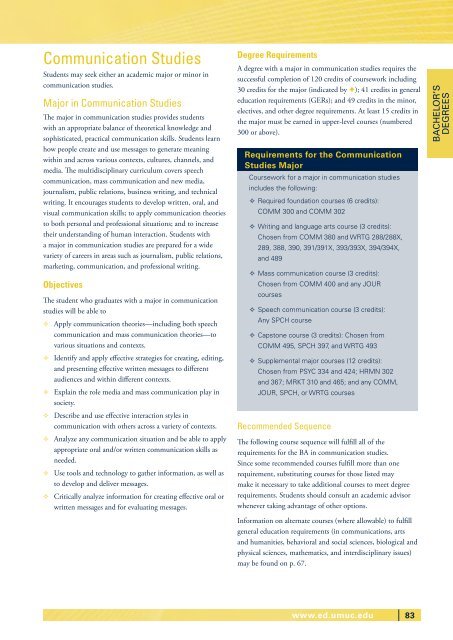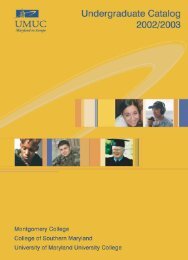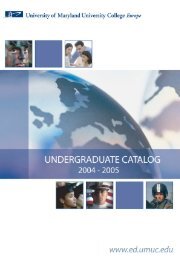UNDERGRADUATE CATALOG - UMUC Europe
UNDERGRADUATE CATALOG - UMUC Europe
UNDERGRADUATE CATALOG - UMUC Europe
You also want an ePaper? Increase the reach of your titles
YUMPU automatically turns print PDFs into web optimized ePapers that Google loves.
Communication Studies<br />
Students may seek either an academic major or minor in<br />
communication studies.<br />
Major in Communication Studies<br />
The major in communication studies provides students<br />
with an appropriate balance of theoretical knowledge and<br />
sophisticated, practical communication skills. Students learn<br />
how people create and use messages to generate meaning<br />
within and across various contexts, cultures, channels, and<br />
media. The multidisciplinary curriculum covers speech<br />
communication, mass communication and new media,<br />
journalism, public relations, business writing, and technical<br />
writing. It encourages students to develop written, oral, and<br />
visual communication skills; to apply communication theories<br />
to both personal and professional situations; and to increase<br />
their understanding of human interaction. Students with<br />
a major in communication studies are prepared for a wide<br />
variety of careers in areas such as journalism, public relations,<br />
marketing, communication, and professional writing.<br />
objectives<br />
The student who graduates with a major in communication<br />
studies will be able to<br />
G Apply communication theories—including both speech<br />
communication and mass communication theories—to<br />
various situations and contexts.<br />
G Identify and apply effective strategies for creating, editing,<br />
and presenting effective written messages to different<br />
audiences and within different contexts.<br />
G Explain the role media and mass communication play in<br />
society.<br />
G Describe and use effective interaction styles in<br />
communication with others across a variety of contexts.<br />
G Analyze any communication situation and be able to apply<br />
appropriate oral and/or written communication skills as<br />
needed.<br />
G Use tools and technology to gather information, as well as<br />
to develop and deliver messages.<br />
G Critically analyze information for creating effective oral or<br />
written messages and for evaluating messages.<br />
degree Requirements<br />
A degree with a major in communication studies requires the<br />
successful completion of 120 credits of coursework including<br />
30 credits for the major (indicated by F); 41 credits in general<br />
education requirements (GERs); and 49 credits in the minor,<br />
electives, and other degree requirements. At least 15 credits in<br />
the major must be earned in upper-level courses (numbered<br />
300 or above).<br />
requirements for the Communication<br />
Studies Major<br />
Coursework for a major in communication studies<br />
includes the following:<br />
G Required foundation courses (6 credits):<br />
COMM 300 and COMM 302<br />
G Writing and language arts course (3 credits):<br />
Chosen from COMM 380 and WRTG 288/288X,<br />
289, 388, 390, 391/391X, 393/393X, 394/394X,<br />
and 489<br />
G Mass communication course (3 credits):<br />
Chosen from COMM 400 and any JOUR<br />
courses<br />
G Speech communication course (3 credits):<br />
Any SPCH course<br />
G Capstone course (3 credits): Chosen from<br />
COMM 495, SPCH 397, and WRTG 493<br />
G Supplemental major courses (12 credits):<br />
Chosen from PSYC 334 and 424; HRMN 302<br />
and 367; MRKT 310 and 465; and any COMM,<br />
JOUR, SPCH, or WRTG courses<br />
Recommended Sequence<br />
The following course sequence will fulfill all of the<br />
requirements for the BA in communication studies.<br />
Since some recommended courses fulfill more than one<br />
requirement, substituting courses for those listed may<br />
make it necessary to take additional courses to meet degree<br />
requirements. Students should consult an academic advisor<br />
whenever taking advantage of other options.<br />
Information on alternate courses (where allowable) to fulfill<br />
general education requirements (in communications, arts<br />
and humanities, behavioral and social sciences, biological and<br />
physical sciences, mathematics, and interdisciplinary issues)<br />
may be found on p. 67.<br />
www.ed.umuc.edu 83<br />
BACHELoR’s<br />
dEGREEs






